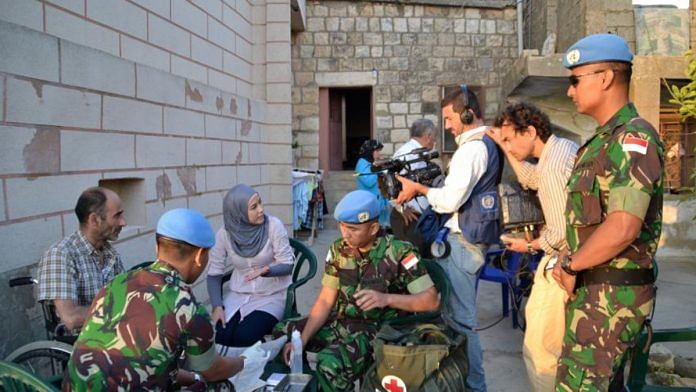New Delhi: With the Lebanese Shi’ite militant group Hezbollah threatening to open another front against Israel amid the latter’s war with Hamas, the United Nations Interim Force in Lebanon (UNIFIL) has warned about increasing border clashes and pushed for de-escalation.
Established in 1978, the UNIFIL — to which India contributes hundreds of troops — now serves as a buffer between Lebanon and Israel along the Blue Line, drawn by the UN after Israel withdrew from south Lebanon in May 2000.
Amid the current clashes, the force — which said its own headquarters were hit by a rocket on 15 October, with no casualties — has engaged with authorities on both sides of the Blue Line and urged them to allow peacekeepers to find solutions.
“No one wants to see more people hurt or killed,” the mission said in a statement.
Tensions began to soar a day after Hamas’ surprise attack on Israel on 7 October, when Hezbollah conveyed “solidarity” with the Palestinian people and said it had targeted Israeli military positions in the disputed Shebaa Farms, a sliver of land between Lebanon and Syria.
Since then, Israel has scrambled a significant number of troops, declared its northern border a closed military zone, and reportedly taken out a Hezbollah “cell” on the border, while the militant group has said it targeted Israeli positions with rockets.
Backed by Iran, Hezbollah, which has been designated a terrorist outfit by the US, the UK and the European Union, among others, has a strong military and political presence in Lebanon.
Israel considers Hezbollah a formidable rival. Israeli intelligence reportedly estimates that the group has an arsenal of 1,50,000 rockets and missiles, including precision-guided missiles that can hit anywhere in Israel.
In 2006, Israel and Hezbollah fought a war after the latter captured two Israeli fighters on the Lebanese border. The war lasted 34 days and reportedly resulted in the deaths of around 1,300 Lebanese nationals and 165 Israelis.
After the war, the UNIFIL deployed an expanded contingent in the region, with battalions from France, Italy and Spain joining the contingents already in place from Ghana and India.
ThePrint takes a look at the UNIFIL and India’s part in UN peacekeeping missions.
Also Read: Days after PM’s call with Abbas, India sends humanitarian aid for Palestinians amid Israel-Hamas war
UNIFIL & India’s contribution
According to the UNIFIL, the mission maintains an “intensive level” of operational and other activities. Since it is based out of Lebanon, 17 per cent of activities are carried out jointly with the Lebanese armed forces. The UNIFIL is also complemented by a five-vessel Maritime Task Force.
According to the UN’s troop count, as of 30 August, UNIFIL consisted of 9,994 peacekeepers from 49 countries. Of these, 893 were Indian.
According to the Ministry of Defence, India is one of the largest contributors to UN peacekeeping, having supplied around 2,75,000 troops to various missions over the past 75 years. Currently, around 5,900 Indian troops are deployed in 12 such missions.
As many as 159 Indian soldiers have died during peacekeeping operations, according to a ministry statement issued in May.
The Army has also established a centre for UN Peacekeeping in New Delhi to impart training in peacekeeping operations. The centre trains more than 12,000 troops every year.
“Indian troops, as part of the UN peacekeeping mission, are stationed along the Blue Line. The Indian Army has an infantry battalion group which includes elements from other arms and services. They are stationed along the Blue Line, catering to the UN mandate. The Indian troops send in reports to India every day and so far, the situation along the Blue Line seems normal,” a source from the Army told ThePrint.
The UN began its peacekeeping operations in 1948 and currently has 12 active missions around the world, with India contributing troops, police personnel, staff officers and experts to all.
India has the highest contribution of troops to missions in regions including the Central African Republic (MINUSCA), South Sudan (UNMISS), the Democratic Republic of Congo (MONUSCO), Mali (MINUSMA), Lebanon, UNISFA in Abyei (a border region disputed by Sudan and South Sudan) and Cyprus (UNFICYP), as well as the UNDOF to maintain the ceasefire between Israel and Syria.
Other missions where India has a presence are MINURSO in Western Sahara, UNTSO in the Middle East, UNMIK in Kosovo and UNMOGIP, which is a military observer group in India and Pakistan.
‘A number of concerning developments’
In June this year, UNIFIL head of mission and force commander Major General Aroldo Lázaro had chaired a regular tripartite meeting with senior officers of the Lebanese Armed Forces and Israel Defense Forces at a UN position in Ras al-Naqoura.
“During the last couple of months, there have been a number of concerning developments along the Blue Line” he said, according to a report on the UNIFIL website. “Despite these events, active engagement has contributed to the prevention of potential escalation and helped maintain stability.”
The UNIFIL head of mission also highlighted a breach in the cessation of hostilities that had occurred on 6 April, 2023, noting increased tension along the Blue Line.
Apart from the UNIFIL, the UN has an ongoing mission in Lebanon called the United Nations Special Coordinator for Lebanon under its department of political and peacebuilding affairs.
(Edited by Nida Fatima Siddiqui)
Also Read: Israel plans more Gaza strikes, U.S. to add air defences to Mideast



